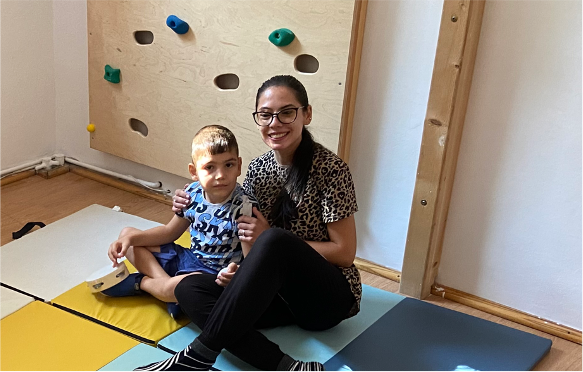Ecaterina’s story
Romania
- Children
- Disability

What was your background and experience with music before starting the distance learning program?
I studied music at the George Enescu National University of Arts, majoring in Classical Singing, then I started, among other things, working with children. Among them came a little boy diagnosed with Asperger’s syndrome, whose diagnosis I did not know about (the mother did not want to tell me initially so that I would not refuse him). After a few sessions, the little boy’s mother told me about the diagnosis and told me that I should do something with music for these children too, so I started looking for more and more information and one day it appeared on Facebook at recommendations a Melotherapy course that was based more on the piano.
So, given your musical and professional background, was there anything about the course that you found particularly important?
Because I didn’t finish psychology or other branches that would help me on the diagnostic side and how I could help them from a behavioural point of view, I found the whole course very valuable from this point of view. I managed to better understand some aspects related to the therapeutic side of music therapy and the video tutorials and case studies were the most useful.
Was there anything you found challenging about the course?
To be able to hold the music therapy sessions without things degenerating. I find it very difficult to keep the balance between unconditional positive regard and those limits that need to be set at some point. These children come after many therapy sessions using different techniques, and I have observed that, at least in Romania at the moment, many therapies are approached where the mentors yell at the children and everything takes place in a very rigid atmosphere. Some children are used to this kind of behaviour and when they see that it is actually ok, that no one is screaming and that everything is in order, they do not understand what is happening. My belief was and still is in applying unconditional positive regard, but without losing control of their behaviour.
I am also a very orderly person who makes plans and puts everything in order, and these sessions taught me that not everything can be controlled, that you have to observe, be inventive, improvise and adapt to the children’s behaviour and what they need.
Another challenge I found was choosing the kids for the group in such a way that they would be compatible and things would work. For example, one of the children I chose was ok in terms of behaviour in the individual assessment, but his behaviour was very different when he was in a group dynamic.
Did what you learned in the course help you overcome these challenges?
All the theoretical information was useful, but when you get to put it into practice it’s not so easy. So when I started the sessions the observation sheets helped me a lot, I tried to improve hour by hour what wasn’t working, and having the supervision helped a lot. Many times you actually get stuck and your brain stops working to come up with ideas, so all the information from the supervision emails was very helpful + the positive mood that accompanied them.
Having completed the Distance Learning Programme, you recently applied to our Musical Instrument Fund for new instruments. Can you give some insight into this?
Well, after the course I decided to continue with the group sessions, and the tools at my disposal were quite few and mostly toys. Having the new instruments… it’s wonderful for me, I was very happy when the package arrived. I will use them in both individual and group music therapy sessions, mostly with Autistic children between the ages of four and 10.
I feel that the children will enjoy it more, and for me it is much easier to improvise and capture them, I have many more options. It means I will be able to vary the activities, the more they are the more interesting and captures their attention. Also, now I can do activities in pairs because I have 2 identical tools and all this variety helps to keep things from getting monotony.
Yesterday I had a session with a little girl where I introduced “rain splashes”. She was very, very happy to hear that sound and was watching with so much interest as the marbles flowed out and at the same time eager to turn the instrumental again. In comparison, using only a tambourine and a drum at a time you feel the need to come up with something new no matter how versatile these instruments are.
What are you working on now / what plans do you have for the future?
Now I have six children with whom I work individually. With two of them I play the piano, they are high functioning, but when they get tired or feel that it is very difficult for them to pay attention, we do activities with instruments. I apply what I have learned in class, we have all kinds of activities with tools and movement. Basic conditions remain for everyone: unconditional positive regard and emotional attunement.
Most recently, I have formed two groups for music therapy sessions. I am excited, but at the same time I hope that everything will turn out well and that the children will enjoy these sessions.
